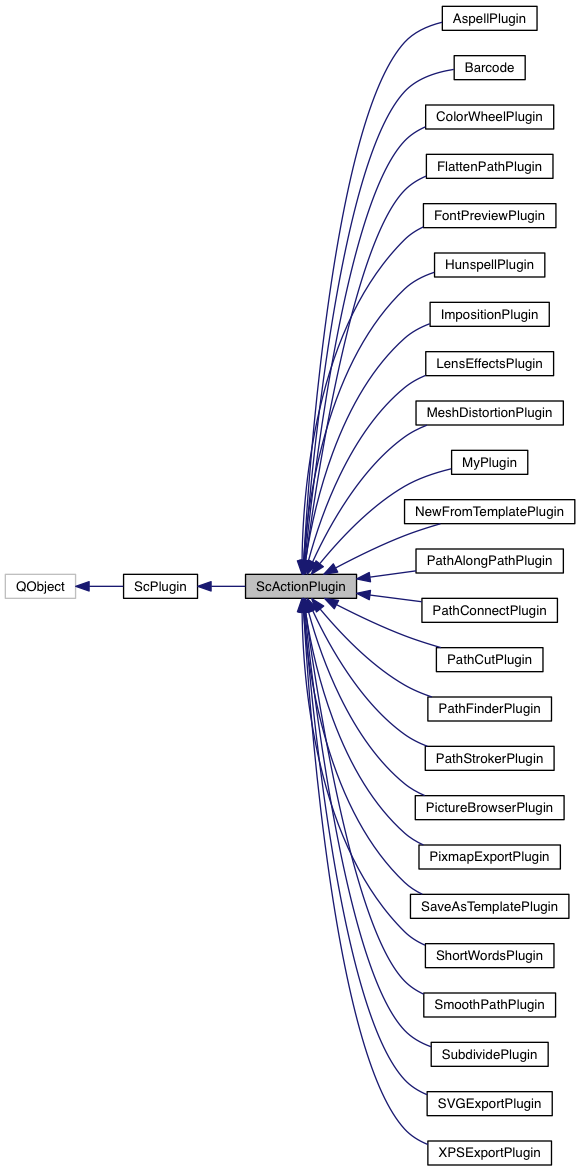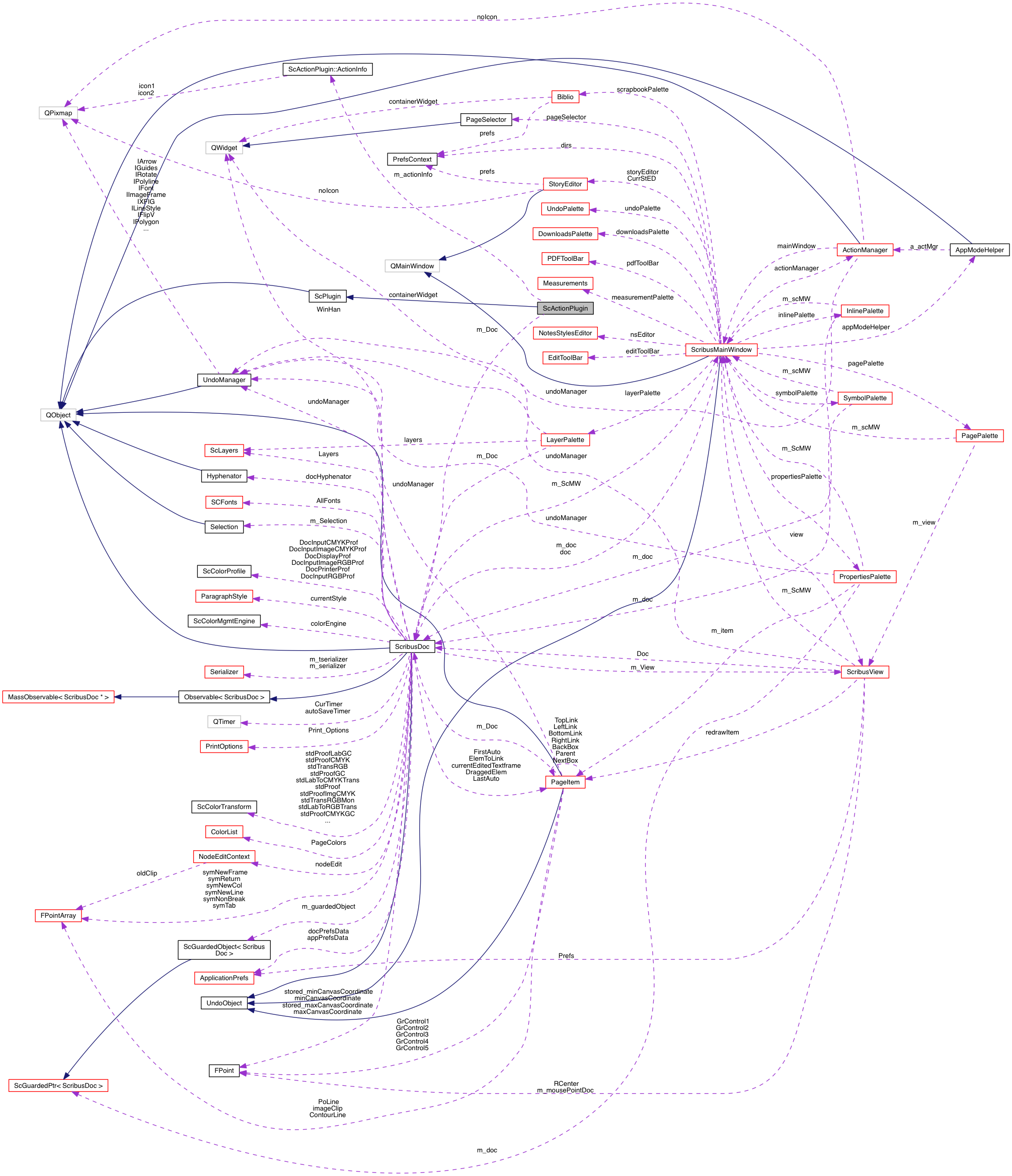|
Scribus
Open source desktop publishing at your fingertips
|
|
Scribus
Open source desktop publishing at your fingertips
|
A plug-in that performs a single action. More...
#include <scplugin.h>


Classes | |
| struct | ActionInfo |
Public Slots | |
| virtual bool | cleanupPlugin () |
| Deactivates the plugin for unloading / program quit. More... | |
| virtual bool | run (ScribusDoc *doc, QString target=QString::null)=0 |
| Run the plug-in's main action. More... | |
| virtual bool | run (QWidget *parent, ScribusDoc *doc, QString target=QString::null) |
| Run the plug-in's main action. More... | |
| virtual bool | run (ScribusDoc *doc, QIODevice *target) |
| Run the plugin on a QIODevice. More... | |
| virtual DeferredTask * | runAsync (QString target=QString::null) |
| Run the plugin asynchronously. More... | |
| virtual DeferredTask * | runAsync (QIODevice *target) |
| Run the plugin asynchronously. More... | |
| const QString & | runResult () const |
| ! Obsolete method - do not use this or rely on it in new code. | |
Public Member Functions | |
| ScActionPlugin () | |
| ctor More... | |
| virtual | ~ScActionPlugin ()=0 |
| Pure virtual dtor - abstract class. | |
| const ActionInfo & | actionInfo () const |
| virtual bool | handleSelection (ScribusDoc *doc, int SelectedType=-1) |
| handle the documents selection. More... | |
 Public Member Functions inherited from ScPlugin Public Member Functions inherited from ScPlugin | |
| ScPlugin () | |
| ctor, returns a new ScPlugin instance More... | |
| virtual | ~ScPlugin ()=0 |
| Destroy the ScPlugin instance. More... | |
| virtual const QString | fullTrName () const =0 |
| Plug-in's human-readable, translated name. More... | |
| virtual bool | newPrefsPanelWidget (QWidget *parent, PrefsPanel *&panel, QString &caption, QPixmap &icon) |
| Create and return a prefs UI panel for the plugin. More... | |
| virtual bool | newPrefsPanelWidget (QWidget *parent, Prefs_Pane *&panel, QString &caption, QPixmap &icon) |
| virtual const AboutData * | getAboutData () const =0 |
| Return descriptive information about the plug-in. More... | |
| virtual void | deleteAboutData (const AboutData *about) const =0 |
| const QString & | lastError () const |
| Text summary of last error encountered. More... | |
| bool | hasLastError () const |
| Returns if lastError message is not empty. | |
| void | clearLastError () |
| Clear last error message. | |
| virtual void | languageChange ()=0 |
| Update all user-visible text to reflect current UI language. More... | |
| const QString | pluginTypeName () const |
| Returns human readable plugin type from plug-in's pluginType. | |
| virtual void | addToMainWindowMenu (ScribusMainWindow *)=0 |
| Allow plugins to add to a main menu. | |
| virtual void | setDoc (ScribusDoc *doc) |
| hooks that plugins can use to detect if the current document was closed etc.. | |
| virtual void | unsetDoc () |
| virtual void | changedDoc (ScribusDoc *doc) |
Protected Attributes | |
| ActionInfo | m_actionInfo |
| QString | m_runResult |
| ScribusDoc * | m_Doc |
 Protected Attributes inherited from ScPlugin Protected Attributes inherited from ScPlugin | |
| QString | m_lastError |
| Human readable, translated version of last error to occur. | |
A plug-in that performs a single action.
ScActionPlugin describes a plug-in that is used to perform a single well defined action. Uses include data import/export, displaying a dialog, or doing a single batch task. It is automatically connected to the user interface and has simple methods to trigger the plug-in's supported action.
If you need more complex user interface integration, persistent operation, etc, you may be better off with ScPersistentPlugin.
| ScActionPlugin::ScActionPlugin | ( | ) |
ctor
|
inlinevirtualslot |
Deactivates the plugin for unloading / program quit.
This method will be called when the plug-in is about to be unloaded, or if the plug-in manager has been asked to disable the plug-in. This method will never be called unless initPlugin has been called first, but there is no guarantee the plugin will actually be unloaded after this is called, or before initPlugin is called again.
Reimplemented in PictureBrowserPlugin.
|
virtual |
handle the documents selection.
This function is dedicated for handling the documents selection By default this uses the notSuitableFor, forAppMode, needsNumObjects, firstObjectType and secondObjectType variables. If you need more control over the selection reimplement this function.
Reimplemented in PathAlongPathPlugin.
|
pure virtualslot |
Run the plug-in's main action.
Run the plug-in's default action synchronously, blocking the rest of the application until this method returns.
This method should generally call run(..., QIODevice* target) or run(..., QString target) to do the work. This is done by default, with the assumption that the target is a file. The argument is opened as QFile with IO_ReadOnly or IO_WriteOnly mode, depending on plugin type, and passed to run(..., QIODevice*). Override this if you need more flexibility.
The optional target argument is a plugin-defined string indicating what the plugin should operate on. It will typically be a filename to import from / export to. Nothing stops a plugin doing funky things like accepting a WebDAV URI, etc, however.
Plug-in authors might want to consider implementing this using the DeferredTask subclass used in runAsync, if the plug-in supports it.
| target | Optional target to operate on (see above) |
Implemented in PathAlongPathPlugin, PathConnectPlugin, XPSExportPlugin, MeshDistortionPlugin, PathFinderPlugin, SVGExportPlugin, LensEffectsPlugin, PathCutPlugin, PathStrokerPlugin, SubdividePlugin, FlattenPathPlugin, SmoothPathPlugin, ImpositionPlugin, ColorWheelPlugin, ShortWordsPlugin, PictureBrowserPlugin, Barcode, PixmapExportPlugin, MyPlugin, HunspellPlugin, AspellPlugin, NewFromTemplatePlugin, FontPreviewPlugin, and SaveAsTemplatePlugin.
|
virtualslot |
Run the plug-in's main action.
This method behaves as the previous one. Except there is a parent widget reference. It's useful e.g. when you need to open a dialog on a specific parent one.
Reimplemented in ImpositionPlugin, HunspellPlugin, and FontPreviewPlugin.
|
virtualslot |
Run the plugin on a QIODevice.
This method is essentially the same as the above, except that it accepts a QIODevice* to work with. This will generally be used for file I/O without the plugin having to know or care where from.
A plug-in MUST return false if it cannot support this method or upon failure. A plug-in MUST supply a working version of this method if it accepts runWith(..., QString) on a local file, and should generally implement the former using this method.
Remember that not all QIODevice*s are seekable, and try to write your code to handle a non-seekable stream.
|
virtualslot |
Run the plugin asynchronously.
This call is similar to the one above, but instead of doing all the work in one big batch, it creates an instance of a DeferredTask subclass to keep track of the job, does some setup, and returns immediately. The DeferredTask, a pointer to which is returned, has already been started when this method returns.
The caller of this method is responsible for handling the aborted() and finished() signals from the DeferredTask, and (if necessary) for cleaning it up using deleteLater(...) once it has finished. Remember that a DeferredTask is automatically deleted when its parent is, if it hasn't already been deleted. This approach is preferred where possible.
See the DeferredTask documentation for details on how it works.
If your plugin implementation does not support asynchronous operation, you must return null. This is the default implementation, so simply ignore this method unless you wish to support it. It is recommended that all new plugins support this interface where possible, even if they can only do part of their work progressively.
If you implement this, you may want to implement run(...) using the same deferred operation and a modal dialog. That'll permit the event loop to continue running for redraws, permit you to update the progress bar, etc.
NOTE: In current Scribus code (August 2005), callers of this method will generally create a modal dialog - possibly with progress meter
If this method is used, the plugin must not be unloaded until all DeferredTask instances have been deleted.
|
virtualslot |
Run the plugin asynchronously.
This method is much the same as the above, but takes a QIODevice* as the target. Please see the documentation for run(..., QIODevice* target) and runAsync(..., QString target) for details.